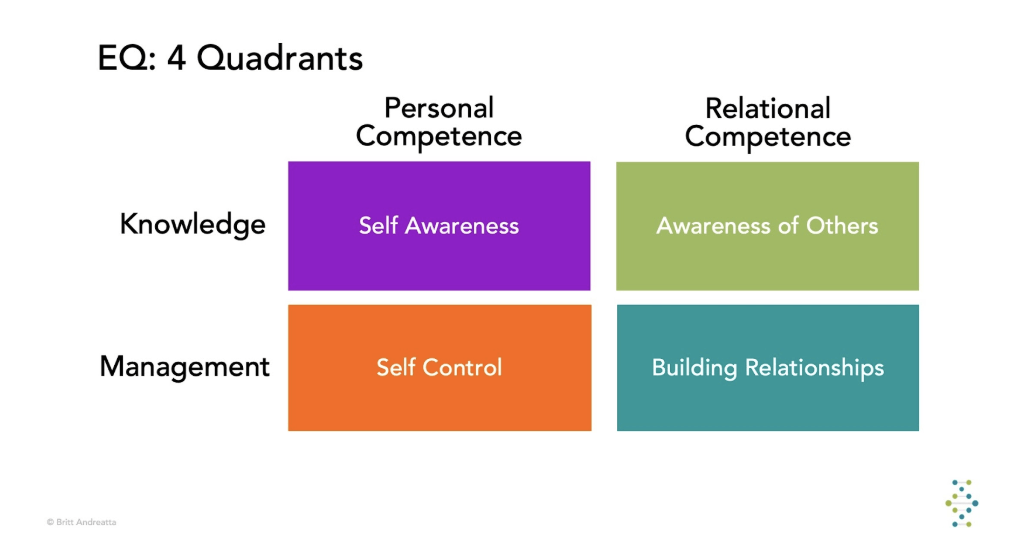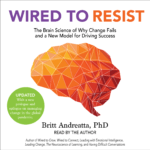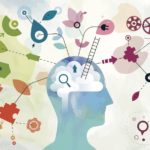Want Better Relationships? Understand that we’re all wired to survive, belong and become

This is an excerpt from my course on Leading with Emotional Intelligence.
Without a doubt, the key to better relationships is emotional intelligence. More than 3000 studies on emotional intelligence have shown that it contributes to both professional and personal success. Boosting your emotional quotient, or EQ, is tied to increased happiness and better relationships, as well as more effective leadership, better decision making, and career success. Who wouldn’t want more of that, right? The good news is that you can raise your emotional intelligence.
What Emotional Intelligence is
Dr. Daniel Goleman coined the term, emotional intelligence, and he likened it to traditional intelligence or IQ. Except emotional intelligence is about how smart we are with the human connection—in other words, how effectively we manage ourselves and our relationships.
Goleman’s research launched a new movement in the world of business and management and you can now find EQ initiatives in organizations all around the world.
EQ training consistently drives phenomenal Return on Investment (ROI) in every sector and industry. That makes sense, because at the heart of every organization is people and the more emotionally intelligent they are, the more effective they will be on every level. It’s through a series of daily conversations, interactions, and decisions that organizations achieve (or fail to achieve) their strategic goals.
Four Main Components of Emotional Intelligence
To better understand your emotional skills, the first step to take is to familiarize yourself with the four quadrants of emotional intelligence.

- Self-Awareness focuses on how well you know yourself, including your values, strengths, and weaknesses, in comparison to how others perceive you.
- Self-Control is about managing your emotions and actions in productive and healthy ways.
- Awareness of Others, knowing their emotions and needs, as well as their skills, preferences, and other aspects of diversity. It’s also about extending empathy.
- Building Relationships and how we utilize our awareness of others to maximize their potential and our relationship.
Ways to Raise Your Emotional Intelligence
There are many actions you can take to build your skills and raise your EQ:
Get to Know Yourself
It’s important to understand your values, which are the attitudes, beliefs, opinions, and experiences that govern how you behave. They shape the choices you make every day, and you are either in or out of alignment with them.
Your values are always a function of your life experiences. Jot down the events and people who’ve influenced you—these can be positive or negative experiences, but they shaped how you see and experience the world now. Reflect on your childhood, family, education, cultural heritage, traumatic events, major successes and failures, and your hopes and aspirations. You can do this as a simple journaling exercise or you might even create a timeline.
The good news is that as you delve into knowing yourself, it becomes much easier to correctly read and identify similar qualities in others like their emotions, values, skills, and work style. For example, when you get clear about your own values and how you demonstrate them, you can start to spot values indicators in others.
Get to Know Others
Now, take a moment to think about your colleagues, family, and friends. Based on your interactions with them over time, what would you identify as their top 5 values? You want to make an educated guess here, based on all the information you have.
Then verify your guess by asking them. You can say something like,
"I have been reflecting a lot on my own values and I am interested in learning more about yours. What are your top values and why?"
Of course, you want to choose a time and place that’s conducive to this topic but you’d be surprised how open people will be when given the chance.
The best strategy for getting to know others is to ask them. This is true for all of the qualities, not just values. While you can certainly base a lot on your observations, you always want to verify your impressions with confirmation from that person.
These conversations not only give you good data but they help build rapport as well.
The truth is that emotional intelligence is more about effort than innate skill. So take time to reflect on what you know about others, gathering and verifying information as you go. With time and focus, you’ll greatly increase your understanding of others.
Understand How Brain Science Drives Humans
In my research on the brain science of success, I discovered that humans are wired for three core things and knowing this will give you a jump start in understanding people you engage with, both personally and professionally.
We are wired to survive.
This is our need for food, water, and shelter. Recent global conflicts and natural disasters have highlighted how primal these needs are. People will go to extraordinary lengths to gain and protect food, water, and shelter because of our most basic need to stay alive. When we are not in crisis, these needs come in the form of job security because earning a paycheck is how we purchase food, water, and shelter. So anything that messes with our sense of job security, like a new boss, a performance review, or being assigned to a new team, can trigger these primal instincts.
We are wired to belong.
This is our need to be part of a community and form meaningful bonds with others.
This is tightly interwoven with our need to survive because our chances of survival are greater when we are part of a tribe. Entire structures of our anatomy are dedicated to helping us understand and connect with others. We hunger for and seek a place to belong and we are sensitive to our place within the group because, biologically, we know that being marginalized from a group can be dangerous.
We are wired to become our best selves.
Once the other two needs are met, our final and perhaps greatest need is to grow into our potential and make the contribution we are here to make. This is the “seeking” part of human nature and it distinguishes us from all the other living organisms on the planet. Our brains are wired to seek new levels of growth and we have brain structures dedicated to creating feelings of reward or success as well as steering us away from failure.
As you develop your understanding of all the people in your life, you’ll gain more and more insight, which leads to many other measures of success including building better relationships.
Related Blogs
JOIN OUR COMMUNITY
Be the first to know of Dr. Britt Andreatta's latest news and research.




